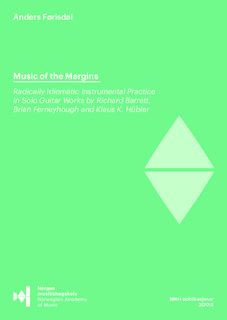| dc.contributor.author | Førisdal, Anders | |
| dc.date.accessioned | 2017-02-16T10:23:01Z | |
| dc.date.available | 2017-02-16T10:23:01Z | |
| dc.date.issued | 2017 | |
| dc.identifier.isbn | 978-82-7853-224-9 | |
| dc.identifier.issn | 0333-3760 | |
| dc.identifier.uri | http://hdl.handle.net/11250/2431027 | |
| dc.description | Dissertation for the PhD degree Norwegian Academy of Music, Oslo 2017 - Avhandling (Ph.D.) - Norges musikkhøgskole, 2017 | nb_NO |
| dc.description.abstract | Sammendrag. - Studien er en undersøkelse av hvilken rolle instrumentalpraksis har i verk for solo gitar av Brian Ferneyhough, Richard Barrett og Klaus K. Hübler. I disse verkene er det musikalske materialet fundert i instrumentalpraksisen og instrumentets og den spillende kroppens fysiske og materielle egenskaper og betingelser. Dermed omdefineres forholdet mellom musikalsk materiale og praksis ut fra sine minste bestanddeler gjennom det Richard Barrett omtaler som en radikalt idiomatisk innfallsvinkel til å komponere. Selv om det radikalt idiomatiske elementet er et sentralt aspekt ved de aktuelle komponistenes verk, er dette aspektet i stor grad oversett av resepsjonen. Undersøkelsens analytiske ramme tar utgangspunkt i Foucault begrep om diskursive praksiser for å kunne diskutere verkenes materielle kroppslighet. Med referanse til Derrida forstås den komposisjonstekniske inkluderingen av de fysiske betingelsene som ligger i musikalsk fremføring som en dekonstruksjon av dikotomien verk/fremføring. Referansen til Foucault muliggjør dessuten etableringen av en teori om instrumentalpraksis som middel til subjektivering. Den dekonstruksjonen av instrumentalpraksis som finnes i verkene kan dermed også betraktes som en konkretisert kritikk av den maktens mikrofysikk som gjennomsyrer vår musikalske tradisjon. Dekonstruksjonen av praksisen kan videre forstås som en kritikk av forestillingen om utøver-subjektet, som er en sentral kategori i vestlig estetisk tenkning. | nb_NO |
| dc.description.abstract | Abstract. - The project seeks to assess the role of instrumental practice in works for guitar solo by Brian Ferneyhough, Richard Barrett and Klaus K. Hübler. In these works, the composers have extracted the musical material directly from the instrumental practice and the concrete physical properties of the instrument and the performing body, restructuring the relationship between musical material and practice from its most minute details in what Richard Barrett terms a radically idiomatic approach to composition. Although clearly central to the interests of the composers in question, the radically idiomatic has been largely ignored by the reception of their works. The analytic framework of the study takes Foucault’s notion of discursive practices as a point of departure in order to grasp the corporeal materiality of the compositions. Drawing heavily on the writings of Jacques Derrida, the inclusion of the physical conditions of musical realisation within compositional technique is understood as a deconstruction of the work/ realisation-dichotomy. Extending the Foucauldian perspective, the project also establishes a theory of instrumental practice as a means of subjectivation. The deconstruction of instrumental practice found in the radically idiomatic works is thus viewed as a critique of the concrete microphysics of power invested in the instrumental tradition, and as a critique of the notion of performer subjectivity so central to Western aesthetic thought. | nb_NO |
| dc.language.iso | eng | nb_NO |
| dc.publisher | Norges musikkhøgskole | nb_NO |
| dc.relation.ispartofseries | NMH-publikasjoner;2017:3 | |
| dc.subject | dekonstruksjon | |
| dc.subject | idiomatikk | |
| dc.subject | instrumentalpraksis | |
| dc.subject | oppføringspraksis | |
| dc.title | Music of the margins. Radically idiomatic instrumental practice in solo guitar works by Richard Barrett, Brian Ferneyhough and Klaus K. Hübler | nb_NO |
| dc.type | Doctoral thesis | nb_NO |
| dc.subject.nsi | VDP::Humaniora: 000::Musikkvitenskap: 110::Musikkteori: 112 | nb_NO |
| dc.source.pagenumber | xvii, 329 s. | nb_NO |
